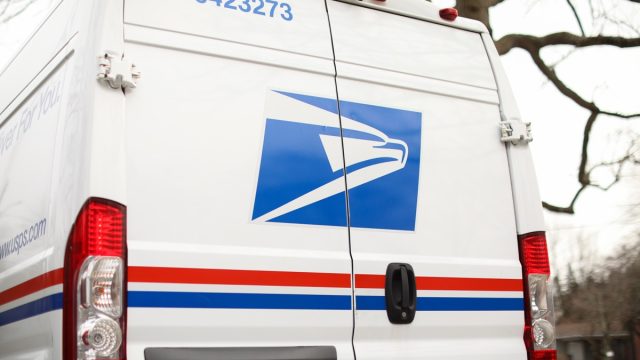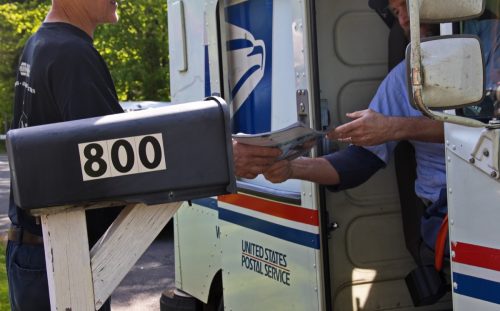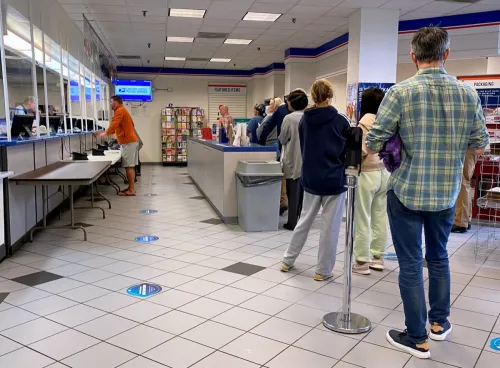New USPS Investigation Shows How Easily Scammers Can Change Your Address

There are a lot of things you may need to cross off your list before moving—including updating your address so you can receive mail at your new home. Fortunately, the U.S. Postal Service (USPS) allows customers to file a Change of Address (COA) request so that their mail can be rerouted from their old residence to their new one. But it seems that some scammers are also taking advantage of this service, meaning that your mail service can be moved by someone other than you while you still reside in the same place.
In fact, a new investigation has proven just how easily scammers looking to steal your identity can change your address, even after the Postal Service has attempted to crack down on fraudulent requests. Read on to learn more about the dangers of this USPS scam.
RELATED: USPS Is Making These Changes to Your Mail, Starting Now.
Change of address fraud has become more prevalent.

Recently, there has been an increase in suspicious actors trying to change people’s addresses without their permission. An April 2022 report from the USPS Office of the Inspector General (OIG) discovered that fraud surrounding the agency’s change of address (COA) process had been rising significantly. There were more than 23,600 cases of fraudulent online COA requests and attempted identity theft in 2021, according to the report. That is a 167 percent jump from 2020, during which just 8,857 cases were reported.
Laurette Olson, a resident of Scarsdale, New York, told CBS New York in May that she became suspicious that she had been hit by the scam when she stopped getting expected mail and began getting notices on her phone that she had bills that were past due. When she reached out to the USPS, she found out that someone had changed her address on file to one in California.
“Complete and utter shock,” Olson told the news outlet of her reaction. “I know about three bills, but I don’t know what else was sent there. And I don’t know what they have in terms of personal information.”
RELATED: USPS Postal Inspector Reveals How to Mail Checks to Avoid Theft.
The USPS previously announced new measures to combat this scam.

With reports of mail-related fraud increasing, the Postal Service announced in May that it would be joining force with the U.S. Postal Inspection Service (USPSIS) to expand crime prevention measures in order to crack down on false address changes. “The majority of COA frauds are driven by an identity theft motive separate from the Postal Service,” the agency said in a May press release, noting that more than 33 COA transactions had been processed in 2022 alone. “The Postal Service is not the intended target but implicated as the fraudster intercepts financially oriented mail, credit cards or checks.”
To prevent COA scams, the USPS said it was working on “strengthening authentication processes” for all COA requests. At the time, the agency said that it had implemented dual authentication Identity Verification Services for online COA transactions in April and would start offering “enhanced in-person” COA transactions at post offices and retail outlets as of May 31.
“COA customers can verify their identity by presenting an approved form of identification to a retail clerk,” the agency explained. “As an additional safeguard, the Postal Service will no longer accept third-party change of address submissions.”
RELATED: USPS Just Issued a New Warning About Mailing Cash.
But a recent investigation reveals cracks in the system.

More than four months after the expanded crime prevention measures were announced, some postal customers are now questioning whether the changes have actually been enacted. In a Sept. 27 report, CBS New York said that its own investigation revealed that scammers can still easily change someone’s address with the USPS. Investigative reporter Tim McNicholas went into three different Manhattan post offices to forward his mail to the address of his girlfriend in Washington, D.C. and was not asked for his ID once.
One clerk even told McNicholas he could simply drop a COA form in the mail, which he decided do in August. A few days later, his mail started showing up at the D.C. address despite him never having his ID checked to verify his identity, according to CBS New York.
“They told us they were taking all these steps to actually clamp down on this problem, this fraudulent change-of-address problem they have, but clearly the message is not getting out across the organization,” New Jersey Rep. Josh Gottheimer told the news outlet.
The agency said it blocked most of the reporter’s requests.

McNicholas said he submitted a total of five COA requests throughout the summer, including the one by mail in August. In a statement to CBS New York, the USPS said that “because of recent enhancements,” the agency actually stopped all but one of the reporter’s requests and sent notifications to him about the attempts that were not approved.
In its May press release, the Postal Service did note that “customers seeking a COA will now receive a validation letter at their old address and receive an activation letter at their new address” as part of the crime crack down changes.
But McNicholas maintains that he did not get a notification for every attempt—although he did receive notifications about some, including a letter in July saying that further verification was required to approve the request. The letter also stated, “if you did not submit this request, no further action is required,” according to the news outlet. Nevertheless, one of the address change request eventually did go through without McNicholas ever submitting further identity verification.
“Several people told me this has happened to them, didn’t get any letter whatsoever. They never got any follow-up,” Gottheimer told CBS New York.
For more USPS news sent right to your inbox, sign up for our daily newsletter.